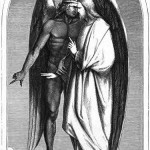We run our website the way we wished the whole internet worked: we provide high quality original content with no ads. We are funded solely by your direct support. Please consider supporting this project.
Isn’t it contradictory to say Jesus is “fully God” and “fully human”?
READER: God is, by definition, eternal, having neither beginning nor end. Human beings are, by definition, finite, beginning at a certain point in time. How, then, can Jesus be both God (eternal) and human (finite)? Isn’t that a contradiction? Similarly, while God is omniscient, humans aren’t. How could Jesus be both omniscient God and non-omniscient human? When Jesus was a little zygote in the womb of Mary, did he also know what was happening on some planet at the other end of the universe?
GREG: Great question! Theologians have worked through the paradox of Jesus being “fully God and fully human” in a number of different ways. The most traditional way is sometimes called a “two minds Christology.” This view affirms that Jesus was, on some level, aware of what was happening on every planet in the universe while he was a zygote in the womb of Mary, even while he was completely unaware of everything outside the womb on another level. I myself have never been able to render this view coherent.
A different approach to this paradox has been labeled “kenotic Christology,” based on the word kenosis, which is Greek for “to empty.” It’s used in Philippians 2 when Paul says Jesus didn’t cling to his divine prerogatives, but instead emptied himself and became a human. The kenotic Christology says that what the Son of God emptied himself of was the exercise of all the divine attributes that are incompatible with being a human. So the Son of God divested himself of his omniscience, omnipresence, and omnipotence to become a genuine human who had limited knowledge, took up limited space, and had limited power.
This view obviously means that God doesn’t need to always exercise his divine attributes to be God. Anyone who believes that humans are created with free will, as I do, should have no problem with this notion, for the only way God could give humans free will is by limiting his omnipotence. Creating a world with free agents thus involves a sort of “kenosis” in God. The kenotic Christology simply takes this logic a bit further and applies it to the incarnation. Just as God limited his power when he created free agents, so too the Son of God limited his power, knowledge, and presence to become a full human being. What the Son of God did not set aside is his perfect divine love, for there’s nothing contradictory about a human loving others perfectly. To the contrary, teaching and empowering humans to love like God is one of God’s central goals for creation.
To me, the kenotic Christology makes more sense and fits the biblical data better than the traditional “two minds” Christology. I offer it in hope that it will help you understand how there is no contradiction involving in affirming Jesus to be fully God and fully human.
Category: Q&A
Tags: Incarnation, Jesus, Q&A, Theology
Topics: Christology, Jesus: Lord or Legend
Related Reading

What is the right way to interpret Revelation?
Few biblical topics have captured the imagination of contemporary evangelicals like the book of Revelation. The recent unprecedented success of the Left Behind series is evidence of this popular fascination. Many evangelicals don’t realize that the futuristic interpretation of Revelation advocated in this popular series is only one of several interpretations evangelicals espouse. Here’s the…

Thankful for the Passion of God
The classical view of God has held that God is impassible, meaning he is above pathos (passion or emotions). The main reason the church came to this view was that, following the Hellenistic philosophical tradition, they associated emotions with change while believing God was above all change (immutable). Moreover, experiencing emotions implies that one is affected by…

What is the significance of Jeremiah 32:35?
As in Jeremiah 19:5, the Lord expresses his dismay over Israel’s paganism by saying they did this “though I did not command them, nor did it enter my mind that they should do this abomination.” If this abomination was eternally foreknown to God, it’s impossible to attribute any clear meaning to his confession that this…

Why Did Jesus Curse The Poor Fig Tree?
Why Did Jesus Curse The Fig Tree? One of the strangest episodes recorded in the Gospels is Jesus cursing a fig tree because he was hungry and it didn’t have any figs (Mk 11:12-14; Mt 21:18-19). It’s the only destructive miracle found in the New Testament. What’s particularly puzzling is that Mark tells us the…

What Does Spiritual Warfare Have To Do with the Cross?
Last week, we covered a few posts on the nature of the Atonement and the Christus Victor view. The following continues this theme, specifically looking the motif of spiritual warfare and how it relates to Christ’s work on the cross. This is an adaptation from Greg’s article in The Nature of the Atonement: Four Views. …

How do you respond to Isaiah 14:24, 27?
The Lord of hosts has sworn: As I have designed, so shall it be; and as I have planned, so shall it come to pass… For the Lord of hosts has planned, and who will annul it? his hand is stretched out, and who will turn it back? The fact that Scripture frequently speaks of…
